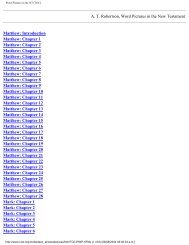Commentary on Joshua - Keil & Delitzsch - David Cox
Commentary on Joshua - Keil & Delitzsch - David Cox
Commentary on Joshua - Keil & Delitzsch - David Cox
Create successful ePaper yourself
Turn your PDF publications into a flip-book with our unique Google optimized e-Paper software.
<strong>Keil</strong> and <strong>Delitzsch</strong> <str<strong>on</strong>g>Commentary</str<strong>on</strong>g> <strong>on</strong> the Old Testament<br />
14:6). According to Judg 1:13 and 3:9, Othniel was Caleb's younger brother. Caleb<br />
gave him his daughter for a wife, as marriage with a brother's daughter was not<br />
forbidden in the law (see my Bibl. Archäol. ii. §107, note 14).<br />
Verse 18-19. When Achzah had become his wife ( "as she came," i.e., <strong>on</strong> her coming<br />
to Othniel, to live with him as wife), she urged him to ask her father for a field. "A<br />
field:" in Judg 1:14 we find "the field," as the writer had the particular field in his<br />
mind. This was not "the field bel<strong>on</strong>ging to the town of Debir" ( Knobel ), for Othniel<br />
had no need to ask for this, as it naturally went with the town, but a piece of land that<br />
could be cultivated, or, as is shown in what follows, <strong>on</strong>e that was not deficient in<br />
springs of water. What Othniel did is not stated, but <strong>on</strong>ly what Achzah did to attain<br />
her end, possibly because her husband could not make up his mind to present the<br />
request to her father. She sprang from the ass up<strong>on</strong> which she had ridden when her<br />
father brought her to Othniel. tsaanach , which <strong>on</strong>ly occurs again in Judg 4:21, and in<br />
the parallel passage, Judg 1:14, is hardly c<strong>on</strong>nected with tsaana` (OT:6800), to be<br />
lowly or humble ( Ges. ); the primary meaning is rather that suggested by Fürst , to<br />
force <strong>on</strong>e's self, to press away, or further; and hence in this case the meaning is, to<br />
spring down quickly from the animal she had ridden, like naapal (OT:5307) in Gen<br />
24:64.<br />
Alighting from an animal was a special sign of reverence, from which Caleb inferred<br />
that his daughter had some particular request to make of him, and therefore asked her<br />
what she wanted: "What is to thee?" or, "What wilt thou?" She then asked him for a<br />
blessing (as in 2 Kings 5:15); "for," she added, "thou hast given me into barren land."<br />
hanegeb (OT:5045) 'erets (OT:776) (rendered a south land) is accus. loci; so that<br />
negeb is not to be taken as a proper name , signifying the southernmost district of<br />
Canaan (as in v. 21, etc.), but as an appellative, "the dry or arid land," as in Ps 126:4.<br />
"Give me springs of water," i.e., a piece of land with springs of water in it. Caleb then<br />
gave her the "upper springs and lower springs:" this was the name given to a tract of<br />
land in which there were springs <strong>on</strong> both the higher and lower ground. It must have<br />
been somewhere in the neighbourhood of Debir, though, like the town itself, it has<br />
not yet been found.<br />
http://207.44.232.113/~bible/comment/ot/k&d/josh/jos92.html (2 of 3) [13/08/2004 01:18:34 p.m.]
















